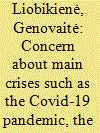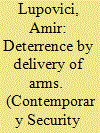| Srl | Item |
| 1 |
ID:
191387


|
|
|
|
|
| Summary/Abstract |
The number of crises experienced around the world forces people to reconsider and reassess various aspects of their lives. The energy crisis caused by the war in Ukraine and uncontrolled climate change revealed the importance of energy-saving behavior. Thus, the aim of this paper is to analyze the concerns about current crises such as the Covid-19 pandemic, the war in Ukraine, and climate change's impact on energy-saving behavior and changes in environmental concern. Referring to the survey conducted in Lithuania in 2022, where 1000 respondents participated, the results revealed that the war in Ukraine was the most concerning problem. The level of climate change concern was slightly lower. Meanwhile, the Covid-19 pandemic was the least important problem in Lithuania in 2022. Furthermore, respondents stated that the Covid-19 pandemic contributed to the changes in environmental concern and energy-saving actions more than the war in Ukraine did. Meanwhile, the Generalized Linear Model results revealed that only the war in Ukraine positively and significantly influenced energy-saving behavior. The Covid-19 pandemic concern negatively affected energy-saving behavior, while the climate change concern factor affected it indirectly, as the interaction of attitudes toward energy consumption. Thus, this study revealed the main aspect of and how to encourage energy-saving behavior in the context of the main current crises.
|
|
|
|
|
|
|
|
|
|
|
|
|
|
|
|
| 2 |
ID:
192534


|
|
|
|
|
| Summary/Abstract |
During the course of the war in Ukraine, various actors have employed a unique type of deterrence by denial: namely, the threat to deliver arms. NATO leaders have committed—through rhetoric and deeds—to continue to deliver weapons to Ukraine if Russia escalated the war in order to deny Russian success. Not only is this type of strategy undertheorized, but it also challenges the distinction between direct and extended deterrence that has been central to deterrence scholarship. In deterrence by delivery of arms, the patron deters not by threatening to fight or deploy forces, but by committing to send weapons. However, the strategy also requires the protégé’s ability to fight. Studying deterrence by delivery of arms opens up understudied areas of deterrence (by denial), and provides a useful opportunity to consider how prominent concepts contribute to the research but also at times limit it.
|
|
|
|
|
|
|
|
|
|
|
|
|
|
|
|
| 3 |
ID:
186557


|
|
|
|
|
| Summary/Abstract |
The global rules-based order has been in transformation for more than a decade, whilst the liberal international order has been in crisis and new international orders are emerging. Within this context, the Russian invasion of Ukraine marks what the Germans have called a Zeitenwende because the multi-order world is now a reality. The article outlines the main characteristics and implications of a multi-order world and outlines four categories of orders that will populate the multi-order world. The article details Putin’s vision for a Eurasian order and how his plans are received within the Eurasian order. The article offers a perspective on how the global dynamics of the new multi-order world might play out, showing that it is likely to be conflictual rather than a cooperative, and that members of the Eurasian order show little enthusiasm for Putin’s vision, resulting in an order held together by force rather than consent.
|
|
|
|
|
|
|
|
|
|
|
|
|
|
|
|